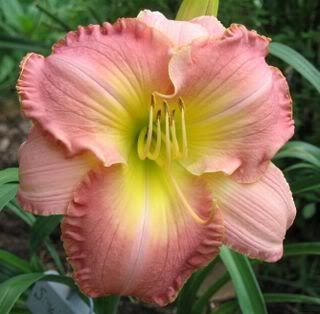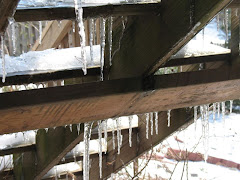I emailed a couple of challenges I regularly face in my garden (maybe you do, too) to Dr. Gillman and he was kind enough to reply.
My email:
Greetings, Jeff:
Okay! How about aphids? Here's my problemo....I have lots (ahem) of daylilies and yes, given time, the ladybugs do take care of them...but, for the last couple of years I have noticed that it is not in time....
Roses, for instance, can withstand them and bloom on...my daylilies, however, especially the dark colors, suffer damage..that shows up later. Light colors don't show the damage or show it very much, but those purples...they can be ruined. There's nothing like waiting with great anticipation for some special blooms...and have them turn out splotchy/misshapen, etc..
Using a strong water stream..for daylilies, is not effective as you can knock off buds or do more damage...I'm not patient enough (this year) to just ride them out.
If you show daylilies or if you sell them...I know those folks use warfare! All the big hybridizers have spraying programs...well, partially because the southern ones must fight rust...but, anyway, back to the aphids...
So, what might I use/try....I would not like to knock everything out as I do have quite a variety of beneficial insects as there is quite a bit of diversity here (shocking, I know). I would just like to engage the battle on the daylilies...is this possible?? Oh, they're out there now...with this warmer weather we've been having...however, I'm not too worried now as I won't see scaping for a while yet.
The other thing is I really fight powdery mildew on my phlox. Last year was particularly bad because, I think, we were in drought and on severe mandatory water restrictions (pray that it is not so this year...but I am not optimistic...I'm afraid local politics enters into this as much or more than actual conditions... I hope not...sorry, I digress). Anyway, with my watering options most likely limited...how might I battle this? To give you an idea, I have something like 17 varieties of phlox and some seedlings...so, not a pretty sight when they're covered.
Now, are you sorry you asked? Ha. Well, this is wonderful (for me)...I do think it will be great to have some information out there on two common problems and what the options might be.
Thank you so much!
*****
His most gracious reply:
OK, here we go, how to get rid of aphids....
Aphids rarely cause enough of a problem that they NEED to be killed.
In
other words, although they can be pretty unsightly, they rarely do
enough damage to severely stunt the growth of the plant, so I'm glad to
hear that mostly you do nothing. That's what I prefer also. However,
what should you do when problems become severe? The hose-off method
is
a favorite, but obviously that isn't working for you because you may
spray buds off. This past summer a friend of mine, Jeff Hahn, and I
tried a bunch of different sprays for knocking out aphids and we found
that the most effective homemade spray was soapy water (2 tablespoons
of
dishsoap per gallon water). Here's the thing though, dish soap can
severely damage plants if it's too concentrated and the concentration
that I just listed is pretty concentrated and will damage some plants,
so you've got to be careful and test this spray before you apply it
willy-nilly. Or you could just use safer soap that you buy at the
garden center. There are plenty of synthetic and organic sprays sprays
that can kill aphids, but for most gardeners they're excessively
effective -- they'll kill good insects as well as bad and put you on an
endless treadmill of needing to apply pesticides because you have no
beneficial insects. So if I were you and was looking for a short term
solution I'd go with soap. If you do end up going with a more toxic
spray I'd pick something whose active ingredient is acephate (Orthene).
Alternatively you could try tanglefoot -- it's a sticky paste that you
can put around the portion of the plant you want to protect (for
example, just below -- but not on -- daylily flower buds). Most
insects
will either die trying to cross this stuff or not cross it at all. It
works pretty well -- you will have a few "escapes" though. And you
will
get messy, especially the first time you use it.
Powdery mildew huh? Everyone seems to want a good way to get rid of
that. For the most part powdery mildew isn't that terrible a pest, but
if you're worried you could try a variety of things. Once again I tend
to like to avoid the more toxic sprays, but you can find potassium
bicarbonate in the garden center and it should work pretty well (It's
similar to baking soda -- which you could also try) you could also try
spraying once a week with a mixture of one part milk to two parts water
-- we've found that that is a pretty effective fungicide (any type of
milk should work -- well -- maybe not chocolate). Or you could just
spray the phlox every day with water. Sure, it sounds
counter-intuitive, but powdery mildew is the one fungus that doesn't
like to get wet. If you are going to use a spray to try to control
powdery mildew you need to start applying very early in the
infestation. If you don't they won't be very effective. If you do
want
to go with something synthetic then you will probably want something
with chlorotalonil as the active ingredient. It will be very effective
and I prefer it to most organic fungicides with the exception of
potassium bicarbonate which I mentioned above.
I'll be checking this blog so if you have any questions or comments
please don't hesitate to let me know.
Thanks,
Jeff
*******
Wow! I hope you enjoyed this as much as I did/have! Thanks so much,
Dr. Jeff Gillman! It's been a pleasure.
******
Update: Please see my follow up email and Dr. Gillman's response:
Hey Jeff: Just a quick note to say that someone pointed out to me
(correctly, I'm pretty sure) that I was really
complaining about thrip damage to my daylilies. Doggone, I should have
known that! Aphids are cool season, thrips warm season pests...as she
reminded me. Anyway, she thinks there is only a chemical control for
aphids and suggested I ask you.
His response:
Thrips .... OK, thrips are tough. the tanglefoot will still work for thrips,
but not quite as well. Acephate is a waste of time and a hard spray of
water will kind of work OK -- better than nothing but not great. You
may try predators such as the minute pirate bug. If you want fast
control there is a spray (which happens to be organic) that works well.
It is also pretty specific for pests so it's relatively easy on predators.
The active ingredient is spinosad -- I believe that you can
get this at Gardens Alive as Bullseye or something similar.
*****
Thanks again to Dr. Gillman for his expertise!





















7 comments:
What an awesome post! Thanks for sharing the answers to your questions. I found the aphids bit very enlightening!
Thanks so much for sharing this. I'm impressed that Jeff Gillman sent such a friendly and helpful reply.
What a nuisance to have aphids on your daylilies! Hope the soap controls them!
The powdery mildew is a pain. Milk! Who would've thought?
Very interesting interview! The milk is recommended for powdery mildew on Crepe Myrtles down here - it seemed to help last year.
Annie at the Transplantable Rose
Hi Katie,
This was interesting to read through - great post. I am going to try the milk remedy on my meadowrues which were hit with powdery mildew last year. And geraniums ... I ended up pulling out two of them since they looked horrible for a few years running.
I just went through your entire label 'Daylilies' and enjoyed it all. You have some good seedlings going. Aphids can be controlled with ultra-fine horticultural oil which is not expensive. Dish soap may damage the plant tissue. The small battery operated hand sprayers are a joy and make the whole process easy to repeat frequently.
I just came over from Garden Punks (Katie wrote about your post and one of mine). I'm glad I stopped by. We had a terrible disaster this week. The gist of it is that we live adjacent to a vineyard, and our cat walked through an area just sprayed by pesticides... and nearly died. Horrible horrible.
At any rate, she's ok and we're recovering, but my ORGANIC garden is a wee bit less organic now. The spray managed to kill the ladybugs and lots of the bees and other good things... and left our garden out of balance. After all that hard work. So we're back to square one with aphids and no one to eat them. I'm going to try the soap method if they get too bad.
Though I'm also a believer in leaving it alone, as nature *does* find a balance. Unless that balance is harmed by humans... argh.
Hi Katie: Why thank you, or rather, thanks to Dr. Gillman! Thanks for coming by!
Hi Kerri: You're welcome! I know! Irritating little guys, but not the worse that can happen, I suppose. Yeah, we'll have to give that a go this year. Thank you for stopping over!
Hello Annie: Really? Hmph, I think that was one thing I didn't have...powdery mildew on the CMs...but I better not speak too quickly! Nice to see you!
Hey Kate: Do let me know how that works out...I guess we could try it on lots of things...very natural! I'm sorry about the geraniums...I really count on them, especially Rozanne. Take care now and thanks!
Hi Di Decaire: You have a long attention span...lol! Thank you! I'm so looking forward to this year as I expect many more seedlings to bloom. Thanks for tips!
Oh Melinda...I am so sorry. Glad to hear that your cat is recovering. I do know how you feel. Hang in there...on all fronts! One of the things that never ceases to amaze me is that things will recover...with time (and some effort), you will see things begin to return. I wonder if the owner over there would at least give you a 24 hr notice (more would be better)? That way, you could attempt to cover some areas, at least...Be encouraged because trying to make things better is worth it. Take good care.
Thank you all very much!
Post a Comment